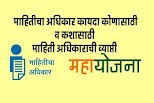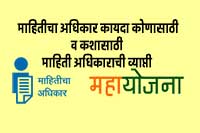माहिती अधिकार कायदा कोणासाठी व कशासाठी
माहिती अधिकार कायद्याचे क्षेत्र किंवा वाव –
भारतातील जम्मू आणि काश्मीर राज्य वगळून सर्व राज्ये आणि केंद्रशासित प्रदेश हे या कायद्याचे क्षेत्र राहील. त्याचे अस्तित्व प्रशासकीय, कायदे आणि न्याय या खात्यांच्या संबंधातील कोणतीही केंद्र शासनाने स्थापन केलेली संस्था अगर कार्यालये यांच्याशी संबंधित, तसेच कायदे तयार करणाऱ्या कायदे मंडळास आणि विधिमंडळाशी संबंधित राहील. ज्या शासकीय कार्यालयांना शासनाचा निधी प्राप्त होतो, त्यांच्याशी या कायद्याचा संबंध राहील. शासकीय संस्थांवर शासनाचे नियंत्रण असते, तसेच शासनाच्या निधीवरच त्यांचे कार्य चालते अशा सर्व संस्थांमध्ये या कायद्यास वाव राहील. शासनाच्या निधीचा वापर जेथे जेथे झाला असेल त्या सर्व क्षेत्रांतील सर्व प्रकारच्या संस्थांशी या कायद्याचा अंतर्भाव राहील.
 |
| माहिती अधिकार कायदा कोणासाठी व कशासाठी | माहिती अधिकार कायद्याची व्याप्ती | Right to Information Act for whom and for what | Institutions not covered by RTI |
माहिती अधिकार कक्षेत न येणाऱ्या संस्था –
खासगी संस्था या कायद्याच्या कक्षेत राहणार नाहीत, असा निर्णय 30 नोव्हेंबर 2006 रोजी सरबजीतराय यांच्या खटल्याच्या निकालात न्याय संस्थेने दिला. मात्र माहिती अधिकारातील नेमणूक झालेल्या केंद्रशासित माहितीचे अधिकार असणाऱ्या कमिशनने जाहीर केले, की एखाद्या खासगी संस्थेने सार्वजनिक मालमत्तेचा वापर केला असेल, करीत असेल किंवा एखाद्या कंपनीने सार्वजनिक मालमत्तेचा वापर केला असेल आणि करीत असेल, तर त्या खासगी संस्था आणि कंपन्या या कायद्याच्या कक्षेत येतील.
माहिती अधिकार कायद्यात येत असलेली माहिती –
1) सरकारी कागदपत्रांच्या नकला मिळविणे.
2) सरकारी कागदपत्रांच्या नकलांची तपासणी आणि पडताळणीकामी उपयोग करणे.
3) सरकारी कामाचे नमुने घेणे आणि ते मिळविणे.
नियम करण्याचे अधिकार – केंद्र सरकार आणि राज्य सरकारांना याबाबतचे नियम बनविण्याचा अधिकार राहील. मात्र ते नियम या कायद्यास अधीन राहून केलेले असतील.
अपूर्ण अथवा थोडीशी माहिती – कायद्यानुसार रेकॉर्डमधील काही भाग राखून ठेवून माहिती द्यावयाची असल्यास त्याबाबत तशी पूर्वसूचना असण्याची गरज असेल आणि त्यास तशी पूर्वपरवानगी घेऊनच अर्धवट माहिती देणे शक्य होईल. मात्र अशा प्रकारच्या प्रकारांना कायदा पूर्णतः संरक्षण देत नाही. त्यामुळे मागितलेली सर्व माहिती मिळणे या कायद्यास धरून बंधनकारक असेल. सार्वजनिक हित लक्षात घेऊनच याबाबतीत निर्णय घेणे गरजेचे असेल. ज्या माहितीमुळे देशाचे हितसंबंध बिघडतील किंवा सार्वजनिक जनजीवनावर त्याचा मोठा परिणाम होईल अशा काही कागदपत्रांबाबतच असे विचार करणे सोईचे ठरते.
खालील बाबतीतील माहिती माहितीच्या अधिकारात देता येणार नाही –
1) ज्या माहितीमुळे देशाची एकात्मिकता धोक्यात येईल. देशाच्या संरक्षणाला बाधा येईल, शास्त्रीय किंवा आर्थिक बाबतीत राज्यावर परिणाम होतील, परदेशी राज्यांबरोबर असलेल्या हितसंबंधांना बाधा येईल किंवा त्या माहितीमुळे मोठ्या घटना म्हणजे दंगली, वाद, शत्रुत्व निर्माण होऊन देशातील शांतता भंग पावेल अशी माहिती देता येणार नाही.
2) न्यायालयीन प्रक्रियेनुसार त्या प्रकरणाची माहिती देता येणार नाही. तसेच न्यायालयाने तसे आदेश दिलेले असल्यास त्याबाबतची माहिती माहितीच्या अधिकारात देता येणार नाही ज्यामुळे कोर्टाचा अवमान होईल.
3) लोकसभेच्या किंवा विधिमंडळाच्या अधिकारातील माहिती देताना ती देण्याने कायदेभंग होणार असेल तर तशी माहिती देता येणार नाही.
4) बुद्धिमत्ता हक्क, व्यापारी आत्मविश्वाला तडा जाणारी घटना, एखाद्या व्यवसायातील गोपनीयता, की ज्यामुळे इतरांवर त्याचा प्रभाव होऊन त्यावर त्याचा परिणाम होईल आणि त्याबाबत पात्र किंवा कार्यक्षम अधिकाऱ्याने सार्वजनिक हिताच्या दृष्टीने ती माहिती देण्यास प्रतिबंध केला असेल.
5) मात्र संबंधित माहिती देणाऱ्या अधिकाऱ्यास असे जाणवले, की सार्वजनिक हितसंबंधांना या माहितीमुळे बाधा निर्माण होईल अशी माहिती देता येणार नाही.
6) परदेशातील सरकारकडून विश्वासाने गोपनीय माहिती प्राप्त झाली असल्यास ती देता येणार नाही.
7) सुरक्षिततेच्या बाबतीत मिळालेली माहिती ही माहितीच्या अधिकारात देता येणार नाही.
8) एखाद्या चौकशीकामी ही माहिती देण्यात अडचण असेल किंवा एखाद्या व्यक्तीची चौकशी सुरू असताना ती माहिती देता येणार नाही.
9) कॅबिनेटची कागदपत्रे, मंत्र्यांनी दिलेली माहिती किंवा सादर केलेली कॅबिनेट बैठकीसमोरील कागदपत्रे, तसेच कॅबिनेटला सादर केलेली सचिव पातळीवरील अगर अधिकारी वर्गाने कॅबिनेटला सादर केलेली कागदपत्रे यांची माहिती देता येणार नाही.
10) एखादी खासगी माहिती, की जी सार्वजनिक हितसंबंध बिघडविणार नाही अशी माहिती देता येणार नाही. ज्यामुळे एखाद्या व्यक्तीच्या खासगी जीवनाशी संबंध असेल अशी माहिती देता येणार नाही.
11) लोकांची इच्छा लक्षात घेऊन वरीलप्रमाणेच एखाद्या व्यक्तीच्या व्यापारात आणि ट्रेड सिक्रेट्स यामुळे विनाकारण नुकसान होणार नाही अशा प्रकारची माहिती दिली जाणार नाही.
लेखक : डॉ. रामचंद्र साबळे
माहिती संकलक : अतुल पगार
स्त्रोत: अग्रोवन
Right to Information Act for whom and for what
scope of RTI Act ( mahiti adhikar ) –
All States and Union Territories except the State of Jammu and Kashmir in India shall be subject to this Act. Its existence shall be related to any body or office established by the Central Government in relation to the departments of administration, law and justice, as well as to the legislature and legislature that make laws. The law will be applicable to government offices which receive government funds. This law will have scope in all the institutions which are controlled by the government and run on government funds. The Act will cover all types of institutions in all sectors where government funds have been utilized.
Institutions not covered by RTI ( mahiti adhikar )-
The private sector will not be covered by the law, the judiciary ruled in Sarabjit Ray’s case on November 30, 2006. However, the RTI ( mahiti adhikar ) Commission appointed by the RTI declares that if a private entity has used public property, is doing so, or if a company has used public property, then those private entities and companies will come under the purview of this Act.
Information coming under the Right to Information Act –
1) Obtaining copies of government documents.
2) To check and verify the use of copies of government documents.
3) To take samples of government work and get it.
Right to make rules – The Central Government and the State Governments will have the power to make rules in this regard. However, those rules will be made subject to this law.
Incomplete or inadequate information – As per the law, if any part of the record is to be retained, such prior notice will be required and it will be possible to give partial information only with such prior permission. However, the law does not fully protect such types. Therefore, it will be mandatory under this law to get all the information requested. It will be necessary to take a decision in this regard keeping in view the public interest. It is pertinent to consider this only in the case of certain documents which may harm the interests of the country or have a profound effect on public life.
The following information cannot be provided under RTI ( Mahiticha Adhikar ) –
1) Information that threatens the integrity of the country. It will not be possible to report that the country’s defense will be hampered, the state will be affected scientifically or economically, interests with foreign states will be hampered or that such incidents will lead to major incidents such as riots, disputes, hostilities and disturb the peace in the country.
2) The case cannot be disclosed as per the court procedure. Also, if the court has made such an order, the information about it cannot be given in the RTI ( mahiti adhikar ) , which would be a contempt of court.
3) If giving information while giving information in the power of Lok Sabha or Legislature is against the law, such information cannot be given.
4) The right to intelligence, the breach of business confidence, the confidentiality of a business, the effect it may have on others and the discretion of a competent or competent authority to disclose such information in the public interest.
5) However, the officer providing the relevant information felt that the public interest could not be informed that this information would be hampered.
6) If confidential information is received from a foreign government in good faith, it cannot be given.
7) Information obtained in the case of security cannot be given under the Right to Information Act.
8) An interrogator may have difficulty providing this information or may not be able to provide that information while an individual is being interrogated.
9) Documents of the Cabinet, information given by the Minister or documents submitted before the Cabinet meeting, as well as documents submitted to the Cabinet by the Secretary level or the official class submitted to the Cabinet shall not be disclosed.
10) A private information, which will not harm the public interest. Which may not provide information relating to a person’s private life.
11) Considering the will of the people, such information will not be given in such a way as to cause undue harm to a person’s trade and trade secrets as above.
